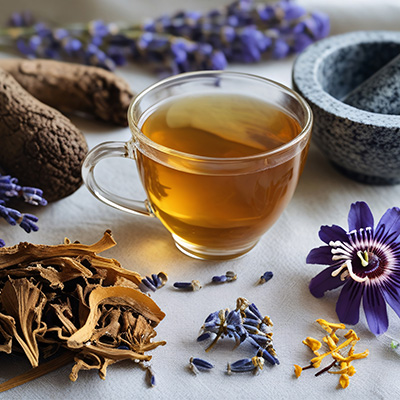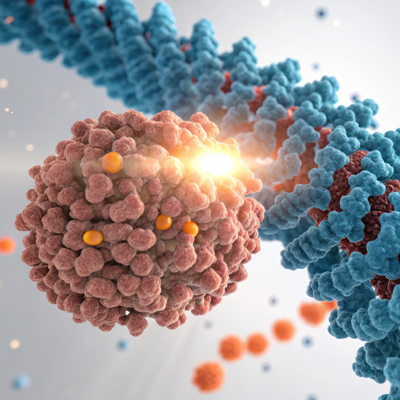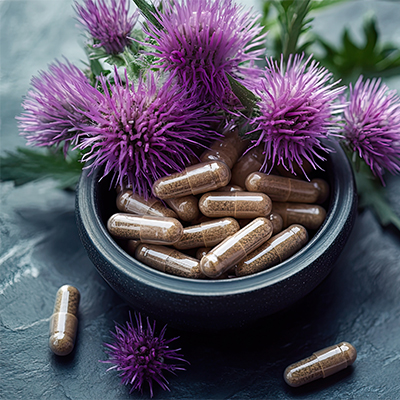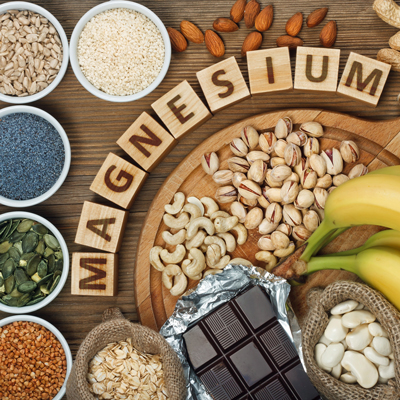Hormones
All information about "Hormones" and the related magazine articles can be found here.
Our articles are written clearly and link to scientific studies where relevant. This is how we meet our own standards: we regularly deliver new, high-quality content for you—free of charge, no sign-up required, with the highest possible benefit to you.

When the hormone balance changes
Gentle nutritional support through the menopause
The menopause changes many things - both physically and emotionally. Myo-inositol, vitamin D3 and magnesium can help to boost your well-being, support your metabolism and activate new sources of energy. Find out more here!

Comfort food for super moms
Choline, lecithin & vitamin B12 - powerful micronutrients for a strong pregnancy
Did you know that certain nutrients can have a positive effect not only on your well-being, but also on your baby's development? Choline, lecithin and vitamin B12 are little helpers with a big effect - for strong nerves, clear thoughts and a good gut feeling during this special time.

Playground power for every day
Calcium & vitamin K2: For bone health that grows with you
Whether romping around with the children or the daily balancing act between job and family - strong bones are the stable foundation. Find out how calcium and vitamin K2 can playfully help to strengthen your bones.

Naturally powerful: Turmeric, boswellia & ginger
Learn how to gain more zest for life with plant power
Plant-based active ingredients can help to reduce inflammation and make everyday life more active and mobile - whether in the garden, during sport or on a family outing.

Finally sleep well again - even in summer!
Discover natural sleep aids with melatonin, passion flower & co.
Is the summer light depriving you of sleep? We show you how you can support your sleep-wake rhythm with natural remedies such as melatonin and passionflower.

Sun protection from within - with the power of vitamin A, astaxanthin and omega-3
Strengthen your skin with natural nutrients that reduce oxidative stress, soothe inflammation and prevent premature ageing.
The first rays of sunshine are here - but your skin is particularly sensitive after the winter. Discover how vitamin A, the antioxidant astaxanthin and essential omega-3 fatty acids can protect your skin from the inside out and optimally prepare it for UV radiation. For a radiantly healthy complexion and effective anti-ageing support.

Spring cleaning for the body!
Drain naturally - with nettle, dandelion & potassium
Find out more about dandelion, stinging nettle and potassium to gently drain your body and get back on track with ease!

Naturally against allergies - Black cumin oil and quercetin in use for your well-being
Gentle support from nature for hay fever, pollen allergies and allergic reactions
Itchy eyes, sneezing attacks and constant pollen stress? Black cumin oil and quercetin offer natural help for allergic symptoms. Find out how the two herbal active ingredients work, when it is the right time to use them and what you should look out for when choosing them.

Strong through the pollen season with omega-3 and vitamin E
How to strengthen your child's airways
When pollen irritates the airways, it can quickly become unpleasant for children. Find out why omega-3 and vitamin E can not only support but also prevent and how you can easily incorporate the two substances into your everyday life!

Fit for spring: Stimulate metabolism with inulin, probiotic foods & intestinal cure
Intestinal cleansing for better digestion, the natural effects of inulin and the benefits of probiotic foods for your metabolism
Get a vital start to spring and bring your body into balance - with targeted nutrition that boosts your metabolism, supports digestion and rebalances your gut with the help of a gut cleanse, inulin and probiotic foods. Find out how to boost your gut health and gain new energy - from the inside out!

New cell energy with B vitamins, NADH and alpha lipoic acid
NADH, alpha lipoic acid and B vitamins play a central role in human metabolism for energy, concentration and cell protection.
Discover how these nutrients support the body against exhaustion, oxidative stress and loss of performance - for more vitality and mental strength in everyday life!

Sleep better with lemon balm, passionflower and L-theanine
These natural helpers bring peace to your evening
Sleep disorders? Stress in the evening? Herbal helpers such as lemon balm, L-theanine and passionflower can gently support the sleep-wake rhythm and help you to finally calm down. Read the article now to find out how you can harness the power of nature for restful nights.

Spring fever for the soul
Naturally more balance with 5-HTP, L-tryptophan and vitamin B6
The sun is shining - but everything still feels heavy inside?
These three mood boosters gently help you arrive in spring: for more rest, sleep and stability. Find out more here!

Building inner strength - more relaxed through spring
Plant adaptogens for more balance, energy and mental freshness
Spring is the perfect time to recharge your batteries and do something good for yourself. Rhodiola and cordyceps provide natural and effective support. Find out more here!

Strengthen your immune system with rockrose, zinc and vitamin C
Natural support for your immune system
Cistus, zinc and vitamin C can provide your body with valuable support in moody weather. Find out how these three building blocks gently strengthen your defenses and give you more well-being in everyday life.

Start spring naturally fit with L-citrulline & cordyceps and recharge your batteries
Experience the invigorating power of nature and science. For new energy, strong blood vessels and mental freshness. Ideal for anyone who wants to get off to a powerful start.
The days are getting longer, the light is returning and now is the time to give your body a gentle boost. The combination of L-citrulline, an amino acid that promotes blood circulation, and the vital mushroom cordyceps supports you in a natural way. For more performance, better focus and an all-round vital body feeling.

Moving through spring: supporting joints naturally with MSM, glucosamine and chondroitin
Find out how your joints work - and how targeted nutrients, exercise and high-quality supplements can promote your mobility.
Movement is often difficult after winter. Stiff joints and limited range of motion are not uncommon. Natural active ingredients such as MSM, glucosamine and chondroitin can help to support normal joint function and prevent discomfort. Now is the ideal time to get going with renewed energy. Moving, vital and well nourished into spring.

Vitamin D3 and K2: the perfect combination for bones and well-being
Find out why vitamin D3 and K2 are so important, especially in the dark season, and how they support your immune system and bone health.
Vitamin D3 helps to banish the winter blues, while vitamin K2 promotes the optimal utilization of calcium. Discover the best food sources and find out when targeted supplementation can be useful.

Stopping cravings: How chromium stabilizes your blood sugar levels
Find out why the trace element chromium can reduce cravings and how it supports your metabolism.
Chromium helps regulate blood sugar levels, helps prevent sudden hunger and promotes long-term wellbeing. Discover the benefits of this important nutrient and find out how you can specifically integrate it into your diet!

Thanks to bitter substances and enzymes, a naturally spring-fit and healthy digestion
Find out how bitter substances and enzymes stimulate your digestion, alleviate digestive problems and gently balance the gastrointestinal tract.
Bitters and enzymes naturally support digestion, relieve bloating and promote general well-being. Discover how you can get off to a fresh and stomach-friendly start with bitter foods, the right diet and high-quality food supplements. For a good gut feeling, day after day.

Clear head, full focus - with ginseng & ginkgo
More concentration, less stress: Natural support for everyday life
Spring brings fresh energy - but sometimes your head feels foggy rather than clear? Ginseng and ginkgo are proven plants that can help boost focus and mental performance. Whether for learning, at work or simply for more mental freshness - discover how this power combination can take your concentration to a new level!

Springtime is liver time! How milk thistle & choline take the strain off your liver
Find out how choline, milk thistle and a conscious diet regenerate your liver and support your metabolism in a natural way.
After months of heavy eating, your liver also needs a break. Choline and milk thistle promote natural detoxification, strengthen the fat metabolism and provide fresh energy for body and mind. Discover how you can make your liver fit for spring with targeted nutrition and vital substances. Scientifically sound and naturally effective.

Iron deficiency? How iron tablets support your vitality
In the cold season, a sufficient iron level is particularly important for energy, blood formation and well-being.
Find out which iron supplements optimally support the body, what you should pay attention to when taking them and how you can specifically prevent iron deficiency. For more strength and vitality in winter!

Strengthening the immune system in the cold season. Magnesium as a key mineral
Find out why magnesium is essential for a strong immune system and how you can optimally cover your requirements.
Especially in the cold season, magnesium supports the body's own defenses, ensures normal muscle function and helps to maintain energy. Discover magnesium-rich foods and practical nutrition tips for resilient health in winter!
All about Hormones: Your Key to a Balanced Life
Have you ever wondered why you sometimes feel energised and focused, while other days you are tired and irritable? The answer often lies in the complex workings of our hormones. They work in the background and influence our organs and our well-being. In our guide to hormones – the key to a balanced life – you will learn how these invisible regulators shape your everyday life and how you can optimise your hormonal balance to get the best out of every day.
What role do hormones play in the human body?
The human hormone system has a very complex structure. The most important hormones play a central role in controlling and regulating a variety of vital bodily functions: These chemical messengers are produced by various endocrine glands (hormone glands) and released into the bloodstream to interact with specific target cells in the body and achieve a specific effect.
Through these interactions, the important neurotransmitters influence a variety of processes, including body growth and development, metabolic functions, reproduction, mood and responses to stress [9]. They also help to adjust the body to external and internal changes and maintain a homeostatic balance [9]. In short, the hormonal system is crucial for maintaining a healthy and functioning organism.
How are hormones produced and regulated?
Various hormones regulate our metabolism, body temperature, salt and water balance, circulation, behaviour and much more [1]. But how does the body know which different hormones it should produce in order to be in balance? Hormones are produced by hormone glands (endocrine glands). These glands, such as the thyroid, adrenal glands and pancreas, are part of the endocrine system and are responsible for synthesising and releasing specific hormones. The production and release of our own hormones occurs in response to complex feedback mechanisms that are influenced by various factors such as the nervous system, other hormones in the body and external environmental factors [4].
This regulation ensures that hormone levels remain within an optimal range to support the body's functions. So-called regulatory circuits control the production of most hormones. The various endocrine glands stimulate or inhibit each other [7]. Hormones can also act on their own gland of origin or a higher-level gland and influence the quantity of hormones. Many hormones of the hypothalamus are also regulated with the help of such ‘feedback loops’, in which the amount of a hormone that has already been produced promotes or curbs its own production. The hypothalamus is a part of the brain that plays an important role in controlling the endocrine system, producing hormones that stimulate or inhibit the pituitary gland to release other hormones [7].
What are the different types of hormones?
There are different types of hormones in the body, including steroid hormones, peptide hormones, amino acid derivatives and thyroid hormones [9]. These are produced by various endocrine glands (hormonal glands) and tissues and regulate a variety of physiological processes. Steroid hormones such as oestrogen and testosterone influence reproductive and metabolic functions.
Peptide hormones such as insulin and glucagon are crucial for the regulation of blood sugar levels and energy metabolism. Amino acid derivatives such as adrenaline and thyroxine have an effect on metabolism, heart rate and energy production. Thyroid hormones such as thyroxine regulate metabolic functions and body growth.
How do hormones affect mood and emotions?
Certain hormones influence mood and emotions by acting on the nervous system and the brain [9]. Serotonin, for example, a neurotransmitter often associated with happiness and well-being, can be influenced by hormones. An imbalance of cortisol, for example, which is released during stress, can lead to mood swings. Certain hormones such as oestrogen and progesterone, which vary during the menstrual cycle, can also affect mood.
What are the effects of hormones on metabolism and weight?
Other hormones such as insulin, thyroid hormones and cortisol directly affect metabolism by controlling the absorption, storage and utilisation of nutrients such as carbohydrates, fats and proteins [10]. Insulin, for example, lowers blood glucose levels by transporting glucose from the blood into the cells where it is used for energy or stored as glycogen.
An imbalance of these hormones can affect metabolic processes in the endocrine system, which can lead to metabolic disorders such as diabetes or hypothyroidism, which in turn can be linked to weight gain [11]. Certain hormones such as leptin and ghrelin influence feelings of hunger and satiety by signalling to the brain when we should eat and when we feel full. If this regulatory system is disrupted, this can lead to food cravings, overeating and weight gain.
What influence do hormones have on the menstrual cycle?
Hormones such as oestrogen and progesterone regulate the menstrual cycle. During the cycle, hormone levels rise and fall, which influences ovulation, the thickness of the uterine lining and the onset of menstruation. At the beginning of the menstrual cycle, the ovaries tend to produce less oestrogen, whereas shortly before ovulation they produce a lot [2]. Oestrogen stimulates the formation of the uterine lining, while progesterone supports its build-up and is important for preparing for a possible pregnancy. If fertilisation does not take place, hormone levels fall, which leads to the shedding of the uterine lining and the onset of menstruation.
Many women find the time before and during their menstruation problematic and painful. Find out here how magnesium can support you with menstrual cramps.
How can hormones influence growth and development?
Hormones play an essential role in human growth and body development by regulating various organ systems and controlling important processes such as bone growth, muscle development and reproductive maturation. Testosterone in particular is crucial as it regulates sex differentiation during embryonic development and puberty, promotes secondary sexual characteristics such as penile growth and sperm production, influences the transformation of vellus hair into mature hair follicles and supports both muscle growth and bone formation [3].
What endocrine disorders are there and how are they treated?
There are various disorders of the endocrine system that can affect the body and health. Some of the most common hormonal disorders are [12]:
Underactive thyroid (hypothyroidism): This is where the thyroid gland does not produce enough of the thyroid hormone thyroxine, which can lead to symptoms such as fatigue, weight gain and dry skin. The thyroid gland is often treated by taking thyroid hormone supplements. Selenium can also be used as a supportive measure.
Hyperthyroidism (overactive thyroid): This is the opposite of hypothyroidism, in which the thyroid gland produces too much thyroid hormone thyroxine. Symptoms can include weight loss, nervousness and an accelerated heartbeat. Treatment may include medication, radioiodine therapy or, in some cases, surgery.
Diabetes: Diabetes is a metabolic disorder characterised by a lack of insulin or insulin resistance. Treatment often involves a combination of dietary changes, physical activity, medication and insulin injections.
Adrenal insufficiency: With this problem, the adrenal glands do not produce enough hormones such as cortisol and aldosterone. Treatment usually consists of lifelong intake of hormone replacement preparations.
Pituitary disorders: The pituitary gland in the brain produces various hormones that regulate the human body. It is controlled by the hypothalamus. Impairments in this area can lead to a variety of problems, including an imbalance in other hormone production. Treatment depends on the specific impairment of the endocrine system and may include the administration of replacement hormones, medication or, in some cases, surgery.
The treatment of endocrine disorders is usually carried out under medical supervision and is based on the identification of the underlying cause and a personalised therapy.
What role do hormones play during pregnancy?
During pregnancy, hormones play a crucial role in the regulation of various physiological processes. They not only influence the development of the foetus, but also the adaptation of the mother's organs to the pregnancy. Hormones such as oestrogen and progesterone help to build up the uterine lining and prepare it for implantation of the fertilised egg [13].
During pregnancy, the body also produces hormones such as hCG (human chorionic gonadotropin), which supports the production of progesterone and maintains the pregnancy. Other hormones such as prolactin prepare the breasts for milk production [13]. Overall, hormones regulate a variety of processes during pregnancy that are crucial for the well-being of mother and child. Hormone production takes place in various organs such as the ovaries and the pituitary gland.
How can we regulate and balance hormones naturally?
Regulating and balancing hormones can be achieved naturally through various lifestyle and dietary adjustments:
Regular physical activity: exercise can help regulate hormone levels and improve well-being [14].
Adequate sleep: An adequate amount of sleep is crucial for hormone production and maintaining balance [15].
Stress management techniques: Meditation, yoga and relaxation exercises can help reduce stress and support hormone balance [16].
Balanced diet: A diet rich in vegetables, fruit, wholemeal products and healthy fats can help regulate hormones [17]. Try an alkaline diet.
Limit sugary and processed foods: Reducing sugary and processed foods can help minimise fluctuations in blood sugar levels and improve hormone balance [17].
Certain herbs, supplements such as omega-3 fatty acids and vitamins can also support hormone balance. However, before taking supplements, it is advisable to consult a doctor to consider possible interactions or contraindications.
[1] https://www.internisten-im-netz.de/fachgebiete/hormone-stoffwechsel/regulation-der-hormone.html
[2] https://www.internisten-im-netz.de/fachgebiete/hormone-stoffwechsel/hormondruesen-und-moegliche-erkrankungen/hypothalamus/
[3] https://www.hormonspezialisten.de/sexualhormone/testosteron/funktionen
[4] https://www.studysmarter.de/studium/medizin/innere-medizin/endokrines-system/
[5] https://www.msdmanuals.com/de-de/profi/endokrine-und-metabolische-krankheiten/grundlagen-der-endokrinologie/%C3%BCbersicht-%C3%BCber-das-endokrine-system
[6] https://flexikon.doccheck.com/de/Endokrines_System
[7] https://www.spektrum.de/lexikon/ernaehrung/endokrine-regulation/2470
[8] https://www.bund.net/fileadmin/user_upload_bund/publikationen/fluesse/fluesse_hormonaktive_substanzen_hintergrund.pdf
[9] https://www.endocrine.org/-/media/endocrine/files/patient-engagement/misc_other/hormone_guide_5x5_grid_25x25_english.pdf
[10] https://pubmed.ncbi.nlm.nih.gov/9556085/
[11] https://www.deutsches-schilddruesenzentrum.de/gut-leben-mit-diabetes-experteninterview-mit-prof-zieren/
[12] https://www.frauenaerzte-im-netz.de/erkrankungen/hormonstoerungen/therapie/
[13] https://www.yourhormones.info/topical-issues/hormones-of-pregnancy-and-labour/
[14] https://www.tk.de/techniker/magazin/life-balance/aktiv-entspannen/stress-abbauen-mit-sport-und-bewegung-2093232?tkcm=ab
[15] https://www.aerzteblatt.de/archiv/1375/Neue-Erkenntnisse-der-Chronobiologie-Wie-Hormone-Schlaf-und-Stoffwechsel-regulieren
[16] https://www.daserste.de/information/wissen-kultur/w-wie-wissen/sendung/2012/entspannung-102.html
[17] https://www.hans-riegel-fachpreise.com/fileadmin/hans-riegel-fachpreise/Module/ausgezeichnete-arbeiten/hans-riegel-fachpreise-seminararbeit-vwa-2020-Rathke.pdf
